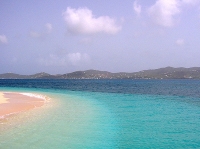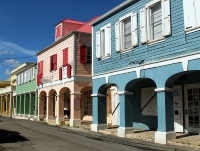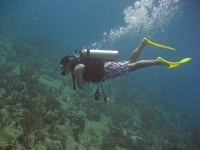St Croix Travel Guide
Less developed than St Thomas, St Croix is the largest and most remote of the three inhabited Virgin Islands. Covered in forested hills and fertile lowlands, it's also surrounded by coral reefs providing excellent diving opportunities, particularly along the north coast.
Located 40 miles (64km) south of St Thomas, the island has two main towns, Christiansted on the northeast coast and Frederiksted on the west coast. Both prospered as commercial ports during the 18th and 19th centuries.
Christiansted is a lively town offering trips to the tiny Buck Island as a popular excursion. Frederiksted is smaller and a sleepy destination, apart from the occasional cruise ship arrival and passengers indulging in a spree of duty-free shopping.
Both towns contain numerous examples of fine Danish colonial architecture. The surrounding landscape is scattered with remnants of sugar plantations, stone windmill towers and ruined houses from the island's sugarcane heyday.
Along with its picturesque beaches and superb diving, St Croix has a variety of indoor and outdoor activities, including hiking, historic sights and attractions, golf and horse riding. There are fine hotels, excellent dining spots and casinos.
Things to do in St Croix
St Croix promises travellers some atmospheric sightseeing, with abandoned plantations, colonial architecture and old manor houses set among the striking natural landscapes. Of course, many travellers revel in the beautiful beaches, with some glorious scuba diving and snorkelling opportunities as well as the odd shopping spree in one of the two major towns of Christiansted and Frederiksted. The most popular beaches on St Croix include Sandy Point, Buck Island Cove, Isaac Bay, Rainbow Beach and Cane Bay.
For those who want to explore the island more thoroughly and get a taste of the culture and history, Estate Whim Museum is an impressive planter's mansion restored to reflect its glory days in the 1700s. Rum production was another of the island's primary industries and visitors can visit the Cruzan Rum Distillery for guided tours and free tastings. Point Udall, the easternmost point of the United States, is a fun spot to visit, and the St George Village Botanical Garden, once a sugarcane plantation, is interesting for a stroll. The Heritage Trail is a 28 mile (45km), self-guided trip that links the main sights of interest on the island and is a good way to take it all in.

Buck Island
A few miles off the northeastern shore of St Croix lies the tiny paradise of Buck Island, one of the best excursions in the Virgin Islands. The entire island and its surrounding coral reef is a protected nature reserve and includes a beautiful beach, an incredible coral marine garden, and two major underwater snorkelling trails with signs that introduce snorkellers to the types of coral and sea life.
Turtle Bay Trail and East End Trail together have become one of the most popular attractions in the US Virgin Islands, while there are also some excellent scuba diving sites off Buck Island Reef. Those wanting to visit Buck Island should take a taxi or drive to Christiansted or Green Cay, on St Croix, and then find a boat trip going to the island. There is no regular ferry service, but it is generally easy to find and join a boat tour.

Christiansted
One of the prettiest towns in the Caribbean, Christiansted has a perfect harbour setting and is the capital of St Croix. Dominating the waterfront is the large yellow building, Fort Christiansvaern, built in the late 1700s to protect the town's harbour against pirates during its days as capital of the Danish colony. It served as an important trading centre for sugar and rum.
Much of the original Danish colonial architecture remains, including the Old Custom House, government buildings, and the atmospheric wharf area lined with pastel-coloured warehouses. Original Danish streets signs survive among modern enterprises like tourist shops, courtyard restaurants, and a spirited bar scene on the waterfront. There are plenty of beach activities nearby and a popular excursion is a trip to Buck Island, which offers superb beaches and coral reefs.

St Croix SCUBA
St Croix Ultimate Bluewater Adventures has been called 'the friendliest dive shop on earth' and offers a fantastic opportunity to anyone who wishes to become a fully-certified diver while on holiday in the Virgin Islands.
While experienced divers will find their every need catered for (try the night dives!), the real beauty of the operation is the ease with which complete novices can obtain their PADI Open Water Diver certification, under the expert guidance of highly-qualified dive staff.
Over and above experiencing the beautiful underwater sights of the Caribbean, doing a diving course in the US Virgin Islands allows visitors to the islands to leave with a skill that they'll cherish for the rest of their lives.
US Virgin Islands travel info
Electricity
120 volts, 60Hz. Two-flat-pin plugs are standard.
Language
English is the official language. Spanish, Creole and some French are also spoken.
Money
The official currency is the US Dollar (USD) divided into 100 cents. Most credit cards are accepted, including American Express, Diners Club, Mastercard, and Visa, and are useful for withdrawing cash at ATMs. Foreign exchange bureaux are available to exchange other currencies, but it is best to arrive with US Dollars as many banks and hotels will not exchange foreign currency.
Tipping
Tipping of 15 to 20 percent is customary for good service. Some hotels and restaurants automatically add a service charge and room tax.
Health
Only bottled water should be drunk outside the major towns, but other than that there are no significant health risks. Medical facilities are of a high standard but travel insurance is vital as medical care is very expensive.
Safety
The US Virgin Islands are generally safe for travellers and the vast majority of visits are trouble-free. But normal precautions against petty crime should be taken, especially in the back streets of towns during the night. Don't leave valuables lying on the beach when snorkelling or swimming.
Local customs
In the US Virgin Islands, politeness is important. Greet people before asking questions or requesting assistance. You may hear locals thanking jumbi (spirits) for good luck, or blaming them for misfortune.
Doing business
The economy in the US Virgin Islands revolves primarily around tourism, though petroleum refining takes place off St Croix. Like many other Caribbean countries, things are pretty relaxed and formal business attire is generally not considered necessary. The people are friendly, polite and shaking hands is common upon introductions for men and women. Business hours are typically 8am to 5pm Monday to Friday, with lunch breaks around 12pm.
Duty free
Travellers may transport 100 cigars or 200 cigarettes or 2kg smoking tobacco; and a US quart of alcohol.
Communications
The international country code for the US Virgin Islands is +1 340. The main mobile service providers on the islands are AT&T Mobility, Sprint Nextel and T-Mobile USA.
Passport & Visa
Entry requirements are the same as for the United States of America. It is highly recommended that passports have at least six months validity remaining after your intended date of departure from your travel destination. There is no immigration control for visitors arriving from mainland USA. Visitors from countries that qualify for the Visa Waiver Programme (VWP) must have a machine-readable passport (MRP) that has a bar code on the photo page. Eligible travellers under the VWP must include biometrics in their machine-readable passports if they wish to enter the country without a visa; this means that unique personal data, such as fingerprints or iris details, must be included in passports. All passports must contain a digital photo image in order to travel visa-free. Those travelling under the VWP must also register on the US government ESTA website three days before departure, which allows the US to screen visitors before travel. All visitors to the USA will have a photograph and two fingerprints taken by an inkless scanner on arrival, including those travelling visa-free under the Visa Waiver Programme. All travellers arriving or departing by air, land or sea between the USA and Mexico, Canada, the Caribbean, Bermuda, and Central and South America are required to present a valid passport. Immigration officials often apply different rules to those stated by travel agents and official sources.
Entry requirements
A valid US passport is required. A visa is not required.
UK passport holders require a valid passport for travel to the US Virgin Islands. British Citizens require a passport valid for duration of stay. Passports with other endorsements must be valid for six months beyond period of intended stay. Under the Visa Waiver Programme (VWP), most British citizens do not require a visa for holiday, transit, or business purposes provided that their passports are machine-readable, the stay does not exceed 90 days, a return or onward ticket is held, and they check into the US government ESTA website prior to departure to register.
Canadians require a passport valid for duration of stay but a visa is not required. Visitors should hold tickets and documents required for return or onward destination.
Australian nationals require a passport valid for duration of stay but do not require a visa for tourist stays of up to 90 days. Passports need to be machine-readable, a return or onward ticket is required, and Australians must check into the US government ESTA website prior to departure.
South Africans must hold a passport valid for duration of stay, and a visa is required. Visitors must have return or onward tickets and the necessary documents for further travel.
Irish nationals require a passport valid for duration of stay, but as Ireland qualifies for the US Visa Waiver Programme, visas are not required for tourists or business stays of up to 90 days. Visitors must have machine-readable passports, return or onward tickets, and they must register on the ESTA site before departure.
New Zealand nationals require a passport valid for duration of stay but do not need visas for stays of up to 90 days. New Zealanders require machine-readable passports and return or onward tickets, and must register on the US government ESTA website before departure.
Useful contacts
US Virgin Islands Tourist Office, St Thomas: +1 340 774 8784 or www.usvitourism.vi
Emergencies: 911Embassies / consulates in other countries
United States Embassy, London, United Kingdom: +44 (0)20 7499 9000.
United States Embassy, Ottawa, Canada: +1 613 238 5335.
United States Embassy, Canberra, Australia: +61 (0)2 6214 5600.
United States Embassy, Pretoria, South Africa: +27 (0)12 431 4000.
United States Embassy, Dublin, Ireland: +354 (0)1 668 8777.
United States Embassy, Wellington, New Zealand: +64 (0)4 462 6000.
Embassies / consulates in US Virgin Islands
British Embassy, Washington DC, USA: +1 202 588 6500.
Canadian Embassy, Washington DC, USA: +1 202 682 1740.
Australian Embassy, Washington DC, USA: +1 202 797 3000.
South African Embassy, Washington DC, USA: +1 202 232 4400.
Irish Embassy, Washington DC, United States: +1 202 462 3939
New Zealand Embassy, Washington DC, United States: +1 202 328 4800.



